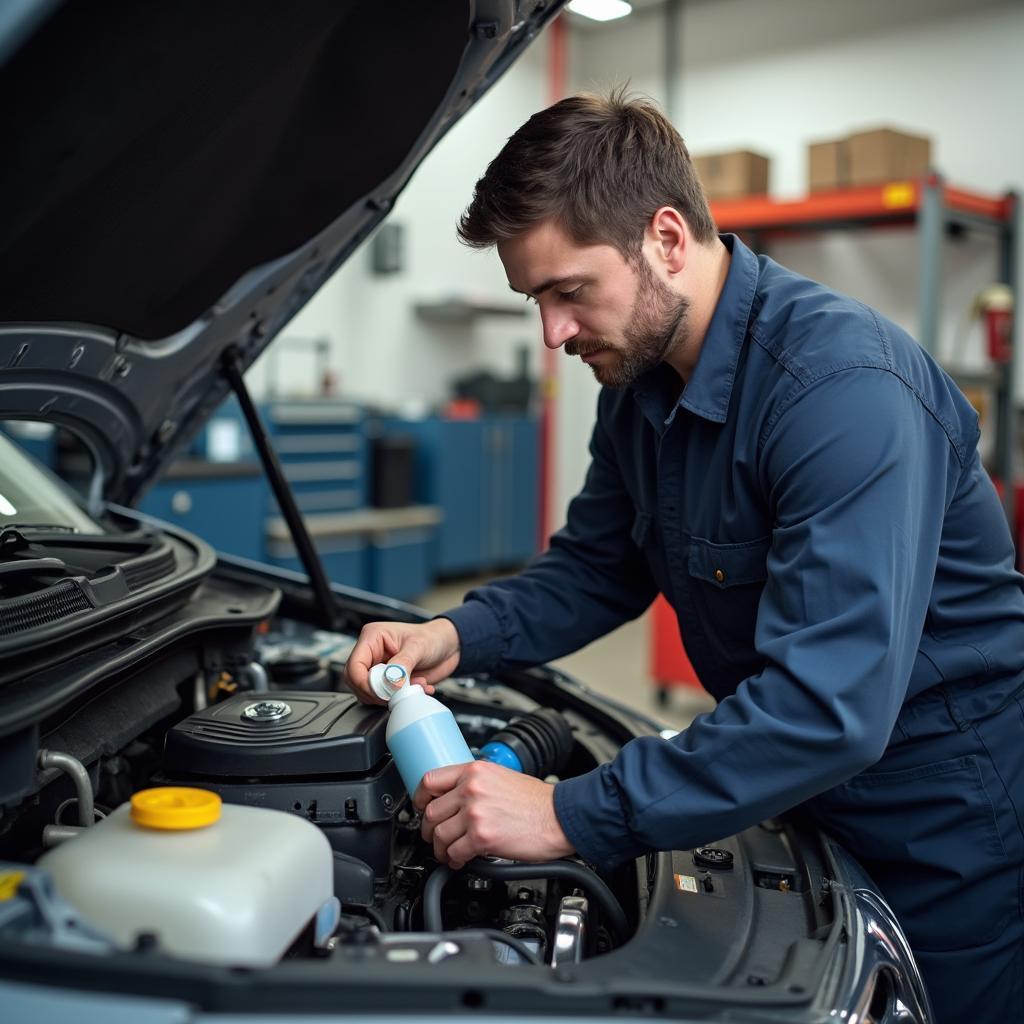Understanding your car’s maintenance needs can feel overwhelming. Between oil changes, tire rotations, and a myriad of other services, knowing when to schedule an appointment can be confusing. That’s where an Auto Maintenance Service Schedule comes in. This comprehensive guide will delve into the importance of these schedules, what they typically include, and how they can save you time, money, and unnecessary stress in the long run.
Why is an Auto Maintenance Service Schedule Important?
Imagine this: you’re driving down the highway when suddenly, your engine starts sputtering, warning lights flash on your dashboard, and your car comes to a grinding halt. This nightmare scenario is often preventable with a proactive approach to vehicle maintenance.
 Car Broken Down on Highway
Car Broken Down on Highway
An auto maintenance service schedule acts as a preventative measure, ensuring your vehicle receives the care it needs to operate smoothly and safely. By adhering to the recommended service intervals, you can:
- Increase vehicle lifespan: Regular maintenance prevents small issues from escalating into major problems that could lead to costly repairs or even total vehicle failure.
- Enhance safety: Routine checks of critical components like brakes, tires, and lights ensure your vehicle remains safe to drive for you and others on the road.
- Improve fuel efficiency: A well-maintained engine, properly inflated tires, and a clean air filter contribute to optimal fuel economy, saving you money at the pump.
- Retain vehicle value: A comprehensive service history demonstrates to potential buyers that your vehicle has been well cared for, maximizing its resale value.
What Does an Auto Maintenance Service Schedule Include?
While the specifics of a service schedule vary depending on the make, model, and year of your car, some common services are typically included:
Routine Maintenance
- Oil and filter change: This essential service lubricates the engine, preventing friction and wear. It’s typically recommended every 3,000 miles or 3 months, whichever comes first.
- Tire rotation: Rotating tires ensures even wear and tear, extending their lifespan and improving vehicle handling. This is usually done every 5,000-7,000 miles.
- Brake inspection and service: Brakes are crucial for safety. Regular inspections ensure they function correctly, with pad replacements and rotor resurfacing as needed.
- Fluid checks and top-offs: Engine coolant, transmission fluid, power steering fluid, and brake fluid are all essential for optimal vehicle performance.
 Mechanic Checking Car Fluids
Mechanic Checking Car Fluids
Scheduled Maintenance
- Air filter replacement: A clean air filter allows the engine to breathe properly, optimizing fuel efficiency and performance. Replacement is typically recommended every 12,000-15,000 miles.
- Spark plug replacement: Spark plugs ignite the fuel-air mixture in the engine. Worn-out spark plugs can lead to reduced fuel economy and engine misfires.
- Timing belt/chain inspection and replacement: The timing belt or chain synchronizes the engine’s valves and pistons. Failure of this component can result in catastrophic engine damage.
- Coolant flush: This service removes contaminants from the cooling system, preventing corrosion and overheating.
- Transmission fluid change: Regular transmission fluid changes ensure smooth gear shifting and prolong the life of the transmission.
Where Can I Find My Car’s Recommended Service Schedule?
Your car’s owner’s manual is the best resource for finding the manufacturer’s recommended service schedule. It outlines the specific maintenance tasks for your vehicle based on mileage and time intervals.
Tips for Staying on Top of Your Auto Maintenance
- Keep a record: Create a logbook or use a smartphone app to track your car’s maintenance history, including dates, mileage, and services performed.
- Set reminders: Use your phone’s calendar or reminder app to schedule upcoming maintenance appointments.
- Don’t ignore warning signs: Address any unusual noises, warning lights, or changes in vehicle performance promptly.
- Choose a reputable mechanic: Seek out a trusted mechanic or auto repair shop to perform your vehicle’s maintenance.
By following a regular auto maintenance service schedule, you can enjoy a more reliable, safer, and longer-lasting vehicle. Remember, proactive maintenance is always a smarter and more cost-effective approach than reactive repairs.
Frequently Asked Questions About Auto Maintenance Schedules
1. How often should I get an oil change?
The general rule of thumb is every 3,000 miles or 3 months, but always consult your owner’s manual for specific recommendations for your vehicle.
2. Can I perform auto maintenance myself?
Some routine tasks, like checking fluid levels and changing the air filter, can be done at home with basic tools. However, more complex services are best left to qualified mechanics.
3. What happens if I miss a scheduled maintenance service?
Missing a service can void your vehicle’s warranty and potentially lead to premature wear and tear on critical components.
4. Why is my check engine light on?
A check engine light can indicate a range of issues, from a loose gas cap to a more serious engine problem. It’s essential to have the code read by a mechanic to diagnose the issue.
5. How can I find a reputable mechanic?
Ask for recommendations from friends and family or search online for reviews of local auto repair shops.
Need assistance with your auto maintenance? Contact us on WhatsApp: +1(641)206-8880 or Email: [email protected]. Our dedicated team is available 24/7 to provide support and guidance for all your car care needs.


